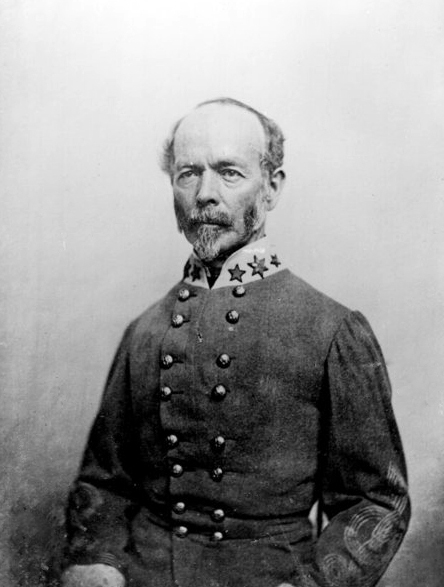Facts, information and articles about Joseph Johnston, a Civil War General during the American Civil War
Joseph Johnston Facts
 Born
Born
February 3, 1807 Farmville, Virginia
Died
March 21, 1891 Washington, D.C.
Years Of Service
1829–37 and 1838–61 (USA)
1861–65 (CSA)
Rank
Brigadier General (USA)
General (CSA)
Commands
Army of the Shenandoah (1861)
Army of Northern Virginia (1861–1862)
Department of the West (1862-1863)
Army of Tennessee (1863-1864)
Department of South Carolina, Georgia, and Florida, and also the Department of North Carolina and Southern Virginia (1865)
Battles
Mexican-American War
Battle of Cerro Gordo
Battle of Chapultepec
Seminole Wars
First Battle of Bull Run
Peninsula Campaign
Battle of Seven Pines
Vicksburg Campaign
Atlanta Campaign
Battle of Bentonville
Joseph Johnston Articles
Explore articles from the HistoryNet archives about Joseph Johnston
» See all Joseph Johnston Articles
Joseph Johnston summary: Joseph Eggleston Johnston (1807 -1891) was the seventh son born to Judge Peter Johnston and Mary Valentine Wood near Farmville, Virginia. He attended the United States Military Academy. In 1845 Johnston married Lydia Mulligan Sims McLane but bore no children.
Johnston Joins The U.S. Army
In 1837 he resigned from the army and later became a civilian topographic engineer aboard a ship during the Second Seminole War. It was here where he received the first of many injuries by a bullet which scraped his scalp. After more combats as a civilian, Johnston rejoined the army and fought in the Mexican-American War.
He constantly requested Jefferson Davis to be promoted further up the ranks, but Davis refused. This led to a major fall out between the pair. However, Johnston was promoted up through the ranks and in 1860 was Quartermaster General of the U.S. Army.
Johnston In The Civil War
When Civil War broke in 1861 and after Virginia seceded, Johnston resigned from the army. He was the highest ranking officer to leave the U.S. army for the Confederacy. He became a brigadier general and took over command of troops from Colonel Thomas Jackson. He was promoted to general in August 1861, but was angry that he was junior to three others. He felt he should have been the senior officer.
He was placed in command of the Army of the Potomac. He fought and was forced to surrender in numerous battles and gained more injuries. He did realise that there were very little resources and tried to protect these assets. Johnston had to evacuate Jackson, Ms as he had very few men, and the city was burned and destroyed.
At the end of the war, Johnston negotiated surrender with Major General William T. Sherman from the Union on April 26th 1865. After this Sherman gave Johnston’s men 10 days of ration food. Johnston never forgot this gesture of goodwill.
